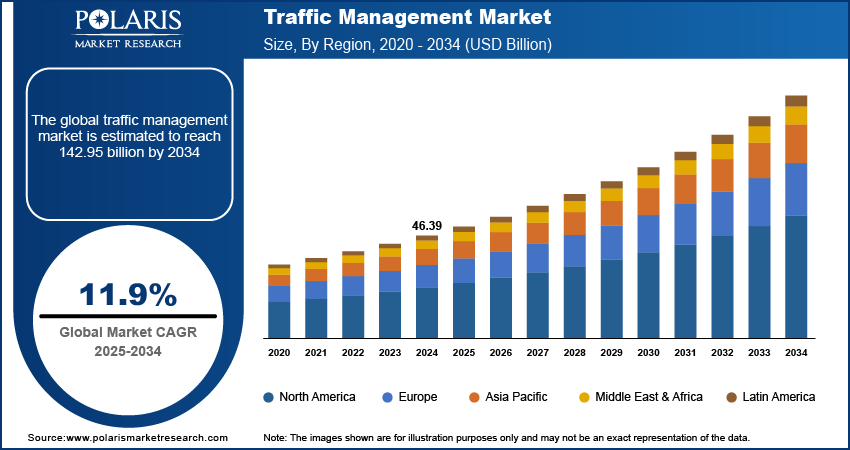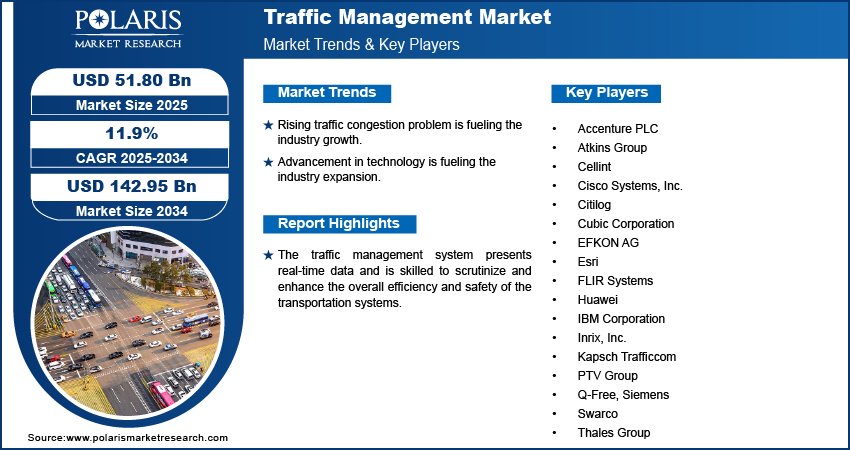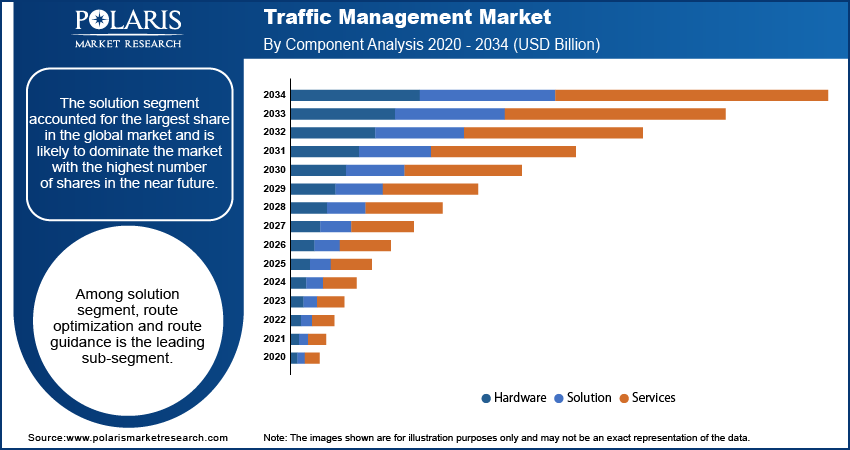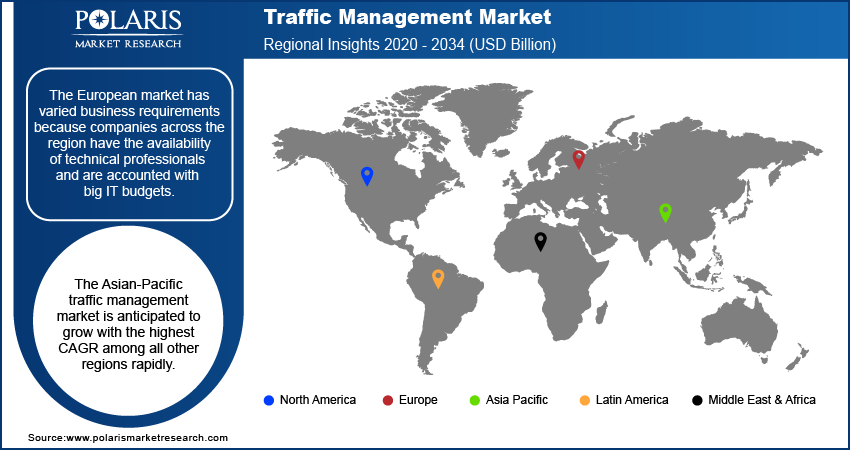
Traffic Management Market Size, Share, Trends, & Industry Analysis Report
By Component (Hardware, Solution, Services), By Deployment Model, By System, By Region – Market Forecast, 2025–2034
- Published Date:Sep-2025
- Pages: 110
- Format: PDF
- Report ID: PM2201
- Base Year: 2024
- Historical Data: 2020 - 2023
The global traffic management market was valued at USD 46.39 billion in 2024 and is expected to reach grow at a CAGR of 11.9% during the forecast period. The growth is driven by launch of advance smart vehicles which integrates with traffic management system and technoligical advancements.
Key Insights
- The solution segment accounted for the largest share in the global market as it enables enterprises to ensure that every traffic management center gets incorporated into traffic light systems and detection devices.
- Based on system, adaptive traffic control system is expected to experience significant growth during the forecast period driven by its advantages in handling condition such as traffic congestions.
- The Europe dominated with largest share in 2024 as region has companies across the region which have the availability of technical professionals and are accounted with big IT budgets.
- Asia Pacific is expected to witness fastest growth during the forecast period driven by growing penetration of advanced technologies.
Industry Dynamics
- The launch of smart vehicle which are compatible with traffic management system is expanding the industry.
- Rising traffic congestion problem is fueling the industry growth.
- Advancement in technology is fueling the industry expansion.
- High development costs is limiting the growth.
Market Statistics
- 2024 Market Size: USD 46.39 Billion
- 2034 Projected Market Size: USD 142.95 Billion
- CAGR (2025-2034): 11.9%
- Largest Market: Europe

To Understand More About this Research: Request a Free Sample Report
Impact of AI on Industry
- AI helps to optimize traffic in real time and predict traffic patterns which makes this system more efficient.
- AI helps to improve public transportation by optimizing bus schedule and support deployment of autonomous vehicle.
- AI based traffic management system is expected to raise privacy concerns, cybersecurity risk and job displacements which is expected to limit the adoption among the conscious governing bodies
The traffic management system presents real-time data and is skilled to scrutinize and enhance the overall efficiency and safety of the transportation systems. The objective of this system is to offer the safe, orderly, well-organized movement of persons and goods and improve the quality of the environment and contiguous with traffic management services for cut-downing the accidents rates. Thereby, these characteristics of the management systems are gaining huge popularity among the population. Moreover, various vendors are continuously introducing their innovations, along with the rapid growth of the internet & communication sector, also fueling the traffic management market demand around the world.

Industry Dynamics
Growth Drivers
The introduction and development of smart vehicles compatible with advanced technologies are act as a major driving factor for the global traffic management market demand. Carmakers are gradually building the market for autonomous cars by initially introducing connected and partially automated cars. These cars can sense their environment with the help of GPS and other sensor technologies like radar and ultrasonic. Thereby, these superior management systems are proficient in interpreting the sensory data for categorizing suitable navigation paths; as well as these cars can also identify obstacles, blind spots, and appropriate signage. As a result, autonomous driving is projected to rise as driver assistance systems are gaining more prominence in the market development of these management systems.
Furthermore, numerous technology-leading vendors, such as Microsoft and Google, along with chief car manufacturers like Tesla, Daimler, Volkswagen, BMW, Audi, and Volvo, are anticipated to introduce fully automated cars by the end of 2025. ZF Friedrichshafen is working on launching an advanced vehicle, compact and sub-compact transport.
Traffic management and mobility as a service are the two foremost systems, which can arrange and manage the system more competently. The execution of the incorporated multimodal traffic management in the MaaS world facilitates the management system to perform with its maximum capability and with an optimized mobility system that is based on multimodal, flawless, flexible, reliable, user-friendly, comprehensive, cost-effective, and environmentally sustainable traveling. Hence, these factor is likely to create lucrative opportunities for traffic management market growth over the foreseen years.
Report Segmentation
The market is primarily segmented on the basis of component, deployment model, system and region.
|
By Component |
By Deployment Model |
By System |
By Region |
|
|
|
|
Know more about this report: request for sample pages
Insight by Component
The solution segment accounted for the largest share in the global market and is likely to dominate the market with the highest number of shares in the near future. This segment enables enterprises to ensure that every traffic management center gets incorporated into its subsystems like traffic light systems and further detection devices. Additionally, it also set up the proper integration of traffic management systems, which facilitates seamless monitoring and quick response replies to events.
Among solution segment, route optimization and route guidance is the leading sub-segment. Route optimization assists the consumers in finding out the best route to travel. The system measures some factors, like the location and number of the essential stops on the route. Other factors comprise traffic jamming of the present time, the number of turns or crossroads along the route, and the top approach to a stop on the route. Thus, these factors are creating lucrative opportunities across the global market.
However, the hardware segment accounts for a significant share in the overall market. This segment presents surveillance cameras that help in monitoring encoded video streams of cameras on roads for identifying incidents and gathering real-time traffic data. Also, this facilitates certain data, which assists in making immediate decisions on incident alerts and demonstrable. Moreover, it offers information on bridges, highways, and tunnels as well. Moreover, these segments also provide store data and real-time data in traffic management that assist in decreasing traffic jamming and road accidents. Therefore, these characteristics may accelerate the penetration of the segment globally.

Insight by System
Based on system, adaptive traffic control system is expected to experience significant growth during the forecast period due to its advantages in travel time reduction by handling condition such as traffic congestions. This system adjusts signal timings in real-time based on traffic conditions, which helps in less traffic congestion. Major cities such as Los Angeles, Singapore, and London have implemented adaptive traffic control systems for travel time reduction and efficient handling of traffic congestion. Moreover, adaptive traffic control systems easily integrate into existing infrastructure which makes its scalable in small town as well as large metropolitan cities which further drives the segment growth.
Geographic Overview
The European market has varied business requirements because companies across the region have the availability of technical professionals and are accounted with big IT budgets. In addition, implementation of the up-graded management system solutions under the smart city projects, as well as the presence of leading vendors in the region is also boosting the market demand. Several countries in Europe, such as the UK, are focusing on improving and strengthening their transportation infrastructure to facilitate smart transportation facilities for consumers.
The Asian-Pacific traffic management market is anticipated to grow with the highest CAGR among all other regions rapidly. The growing penetration of advanced technologies, coupled with the huge investments in research and development activities, is stimulating market growth in the region. Additionally, the rising focus on improving the overall physical infrastructure majorly among the countries such as South Korea, India, China, and Japan are projected to drive the market demand. Furthermore, growing awareness regarding driver safety, increasing cases of accidents, and growth of the transport & logistics sector also significantly fuels the market growth in the near future.

Competitive Insight
Some of the major players operating in the global market include Accenture PLC, Atkins Group, Cellint, Cisco Systems, Inc., Citilog, Cubic Corporation, EFKON AG, Esri, FLIR Systems, Huawei, IBM Corporation, Inrix, Inc., Kapsch Trafficcom, PTV Group, Q Free, Siemens, Swarco, Thales Group.
Industry Development
July 2025, GVMC launched Project SARTHI, an AI-based traffic management pilot in Visakhapatnam, integrating ANPR, RLVD, and facial recognition at key junctions. The initiative aimed to improve traffic flow, reduce violations, and support the city’s smart infrastructure goals.
July 2025, Hikvision launched next-gen traffic cameras and servers powered by large-scale AI models, enhancing detection accuracy and reducing false alarms by up to 75%, significantly improving road safety and traffic management efficiency worldwide
Traffic Management Market Report Scope
|
Report Attributes |
Details |
|
Market size value in 2024 |
USD 46.39 billion |
| Market size value in 2025 | USD 51.80 billion |
|
Revenue forecast in 2034 |
USD 142.95 billion |
|
CAGR |
11.9% from 2025 - 2034 |
|
Base year |
2024 |
|
Historical data |
2020 - 2023 |
|
Forecast period |
2025 - 2034 |
|
Quantitative units |
Revenue in USD billion and CAGR from 2025 to 2034 |
|
Segments covered |
By Component, By Application, By Vertical, By Region |
|
Regional scope |
North America, Europe, Asia Pacific, Latin America, Middle East & Africa |
|
Key Companies |
Accenture PLC, Atkins Group, Cellint, Cisco Systems, Inc., Citilog, Cubic Corporation, EFKON AG, Esri, FLIR Systems, Huawei, IBM Corporation, Inrix, Inc., Kapsch Trafficcom, PTV Group, Q Free, Siemens, Swarco, Thales Group |
FAQ's
• The market size was valued at USD 46.39 billion in 2024 and is projected to grow to USD 142.95 billion by 2034.
• The market is projected to register a CAGR of 11.9% during the forecast period.
• A few of the key players in the market are Accenture PLC, Atkins Group, Cellint, Cisco Systems, Inc., Citilog, Cubic Corporation, EFKON AG, Esri, FLIR Systems, Huawei, IBM Corporation, Inrix, Inc., Kapsch Trafficcom, PTV Group, Q Free, Siemens, Swarco, Thales Group.
• The solution segment dominated the market revenue share in 2024.
• The adaptive traffic control segment is projected to witness the significant growth during the forecast period.
